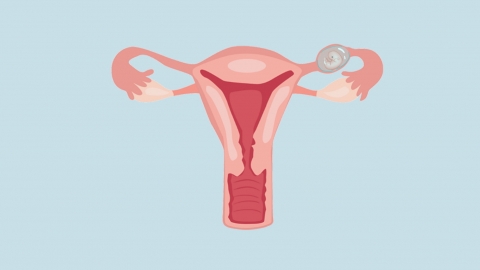What are the symptoms of an ectopic pregnancy?
Ectopic pregnancy generally refers to a pregnancy outside the uterus. Typically, ectopic pregnancy is an abnormal pregnancy in which the fertilized egg implants outside the uterine cavity. Its main symptoms include amenorrhea (absence of menstruation), abdominal pain, vaginal bleeding, fainting and shock, and abdominal mass. Detailed analysis is as follows:

1. Amenorrhea: Similar to normal pregnancy, ectopic pregnancy may also present with amenorrhea. Most patients experience absence of menstruation for 6-8 weeks, although some may not have a clear history of missed periods, mistaking irregular vaginal bleeding for menstruation, thereby overlooking the symptom of amenorrhea. Comprehensive judgment combining other symptoms is necessary.
2. Abdominal pain: Abdominal pain is the main symptom of ectopic pregnancy. Before a tubal pregnancy miscarries or ruptures, it often presents as mild pain or a feeling of pressure on one side of the lower abdomen. When a miscarriage or rupture occurs, sudden sharp, tearing pain on one side of the lower abdomen is typically experienced, often accompanied by nausea and vomiting. The pain may spread throughout the abdomen and even cause referred pain in the shoulder blade area.
3. Vaginal bleeding: After embryonic death, irregular vaginal bleeding often occurs. The blood is usually dark red or deep brown, scanty, and appears in drops, generally not exceeding the volume of a menstrual period. In some cases, the vaginal bleeding may be heavier, resembling a regular menstrual period. Vaginal bleeding may be accompanied by the discharge of decidual tubes or fragments of decidual tissue due to shedding of the endometrial lining.
4. Fainting and shock: When an ectopic pregnancy ruptures, acute intra-abdominal bleeding and severe abdominal pain can lead to fainting. In severe cases, hemorrhagic shock may occur. The symptoms are not proportional to the amount of vaginal bleeding; that is, there may be minimal vaginal bleeding while the amount of intra-abdominal hemorrhage could be substantial. Symptoms include pallor, cold and clammy extremities, rapid and weak pulse, and decreased blood pressure.
5. Abdominal mass: After an ectopic pregnancy miscarries or ruptures, blood clots may adhere to surrounding tissues or organs, forming a mass. When the mass is large, it can be palpated in the lower abdomen, with a relatively hard texture, unclear borders, and possible tenderness upon pressure.
In daily life, if the above symptoms occur, timely attention to bodily changes is necessary. Reducing the risk of accidents can be achieved by avoiding strenuous activities and maintaining emotional stability. Understanding related knowledge also helps in taking appropriate actions during emergencies.





